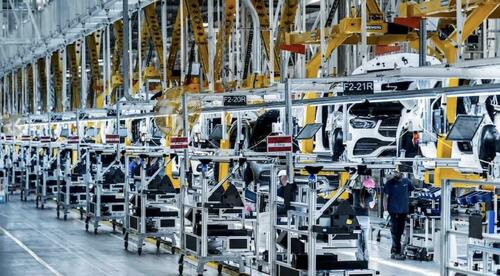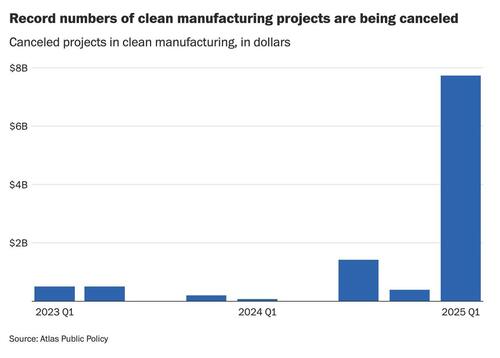Despite a wave of electric vehicle factories popping up across the U.S. in recent years—fueled by tax credits from the Inflation Reduction Act and promises of jobs in mostly Republican areas—many of these projects are now being scrapped, according to a new article by the Washington Post.
Even before former President Trump’s new tariffs, the clean energy shift was already losing momentum.
In just the first quarter of 2025, more EV-related projects were canceled than in the previous two years combined, according to Atlas Public Policy.
Among the losses: a $1 billion thermal battery barrier plant in Georgia and a $1.2 billion lithium-ion battery factory in Arizona. Thousands of jobs are now in question, casting doubt on the future of homegrown EV production.
The U.S. EV manufacturing boom is losing steam as policy uncertainty under the Trump administration causes companies to cancel or delay major projects. “It’s hard at the moment to be a manufacturer in the U.S. given uncertainties on tariffs, tax credits and regulations,” said Tom Taylor of Atlas Public Policy. The group found more clean energy projects were canceled in early 2025 than in the last two years combined, including billion-dollar battery plants in Georgia and Arizona.
The 2022 climate law offered tax credits to boost domestic EV production, but Republican proposals to repeal those incentives—and reverse emissions rules—could cut EV sales by 40% by 2030, according to Princeton.
The WaPo piece says that Aspen Aerogels scrapped its Georgia factory and shifted production abroad. “China is at 50 percent EV penetration already,” said CFO Ricardo Rodriguez. “In North America and Europe, we continue to dabble in this 10 percent to 15 percent level. So, you do start wondering, right, is that progress?”
Other companies are also pulling back. KORE Power dropped plans for a new plant, opting to retrofit an existing facility. EV startups like Nikola Motors and Canoo have gone bankrupt. Even Hyundai is scaling back, now planning to build hybrids, not just EVs, at its new Georgia plant.
“The EV outlook was already looking pretty bearish before the election,” said Trevor Houser of Rhodium Group. “Any downside… would naturally lead to some battery cancellations.”
Bob Keefe of E2 told WaPo: “Nothing is more important to business than market clarity. It’s about as clear as a blizzard at midnight.” He added, “It’s working-class people in places like Georgia, North Carolina, Kentucky, Michigan and Arizona that have seen some of these projects get canceled. And I can tell you who’s benefiting — China and other countries that are doubling down.”
Industry investment has plummeted, with just $176 million in clean manufacturing announced in January—well below the usual $1 billion. “You see a lot of people watching and waiting,” said Jason Grumet of the American Clean Power Association. “If you don’t know if the inputs to your factory are going to dramatically increase in price — it slows things down.”
Diana Furchtgott-Roth of the Heritage Foundation supports the policy shift. “Costly, mandated EVs make poor people poorer and less safe,” she said.
The White House insists its strategy is sound. “The President’s brilliant economic agenda is an all-encompassing plan to revive our economy by unleashing American energy, implementing tariffs to level the playing field, and bringing billions of dollars in historic investments to America’s manufacturing sector,” said spokesman Taylor Rogers.
Still, as projects vanish and momentum fades, Keefe said it best: “Everyone’s looking for a silver lining. I have a hard time finding it.”
Loading…



















